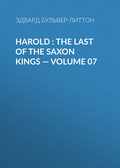
Эдвард Бульвер-Литтон
The Disowned — Complete
Clarence had now reached the porch, and the sound of the shrill bell he touched rang with a strange note through the general stillness of the place. A single servant appeared, and ushered Clarence through a screen hall, hung round with relics of armour, and ornamented on the side opposite the music gallery with a solitary picture of gigantic size, and exhibiting the full length of the gaunt person and sable steed of that Sir Piers de Mordaunt who had so signalized himself in the field in which Henry of Richmond changed his coronet for a crown. Through this hall Clarence was led to a small chamber clothed with uncouth and tattered arras, in which, seemingly immersed in papers, he found the owner of the domain.
“Your studies,” said Linden, after the salutations of the day, “seem to harmonize with the venerable antiquity of your home;” and he pointed to the crabbed characters and faded ink of the papers on the table.
“So they ought,” answered Mordaunt, with a faint smile; “for they are called from their quiet archives in order to support my struggle for that home. But I fear the struggle is in vain, and that the quibbles of law will transfer into other hands a possession I am foolish enough to value the more from my inability to maintain it.”
Something of this Clarence had before learned from the communicative gossip of his landlady; and less desirous to satisfy his curiosity than to lead the conversation from a topic which he felt must be so unwelcome to Mordaunt, he expressed a wish to see the state apartments of the house. With something of shame at the neglect they had necessarily experienced, and something of pride at the splendour which no neglect could efface, Mordaunt yielded to the request, and led the way up a staircase of black oak, the walls and ceiling of which were covered with frescoes of Italian art, to a suite of apartments in which time and dust seemed the only tenants. Lingeringly did Clarence gaze upon the rich velvet, the costly mirrors, the motley paintings of a hundred ancestors, and the antique cabinets, containing, among the most hoarded relics of the Mordaunt race, curiosities which the hereditary enthusiasm of a line of cavaliers had treasured as the most sacred of heirlooms, and which, even to the philosophical mind of Mordaunt, possessed a value he did not seek too minutely to analyze. Here was the goblet from which the first prince of Tudor had drunk after the field of Bosworth. Here the ring with which the chivalrous Francis the First had rewarded a signal feat of that famous Robert de Mordaunt, who, as a poor but adventurous cadet of the house, had brought to the “first gentleman of France” the assistance of his sword. Here was the glove which Sir Walter had received from the royal hand of Elizabeth, and worn in the lists upon a crest which the lance of no antagonist in that knightly court could abase. And here, more sacred than all, because connected with the memory of misfortune, was a small box of silver which the last king of a fated line had placed in the hands of the gray-headed descendant of that Sir Walter after the battle of the Boyne, saying, “Keep this, Sir Everard Mordaunt, for the sake of one who has purchased the luxury of gratitude at the price of a throne!”
As Clarence glanced from these relics to the figure of Mordaunt, who stood at a little distance leaning against the window, with arms folded on his breast and with eyes abstractedly wandering over the noble woods and extended park, which spread below, he could not but feel that if birth had indeed the power of setting its seal upon the form, it was never more conspicuous than in the broad front and lofty air of the last descendant of the race by whose memorials he was surrounded. Touched by the fallen fortunes of Mordaunt, and interested by the uncertainty which the chances of law threw over his future fate, Clarence could not resist exclaiming, with some warmth and abruptness,—
“And by what subterfuge or cavil does the present claimant of these estates hope to dislodge their rightful possessor?”
“Why,” answered Mordaunt, “it is a long story in detail, but briefly told in epitome. My father was a man whose habits greatly exceeded his fortune, and a few months after his death, Mr. Vavasour, a distant relation, produced a paper, by which it appeared that my father had, for a certain sum of ready money, disposed of his estates to this Mr. Vavasour, upon condition that they should not be claimed nor the treaty divulged till after his death; the reason for this proviso seems to have been the shame my father felt for his exchange, and his fear of the censures of that world to which he was always devoted.”
“But how unjust to you!” said Clarence.
“Not so much so as it seems,” said Mordaunt, deprecatingly; “for I was then but a sickly boy, and according to the physicians, and I sincerely believe according also to my poor father’s belief, almost certain of a premature death. In that case Vavasour would have been the nearest heir; and this expectancy, by the by, joined to the mortgages on the property, made the sum given ridiculously disproportioned to the value of the estate. I must confess that the news came upon me like a thunderbolt. I should have yielded up possession immediately, but was informed by my lawyers that my father had no legal right to dispose of the property; the discussion of that right forms the ground of the present lawsuit. But,” continued Mordaunt, proudly, yet mournfully, “I am prepared for the worst; if, indeed, I should call that the worst which can affect neither intellect nor health nor character nor conscience.”
Clarence was silent, and Mordaunt after a brief pause once more resumed his guidance. Their tour ended in a large library filled with books, and this Mordaunt informed his guest was his chosen sitting-room.
An old carved table was covered with works which for the most part possessed for the young mind of Clarence, more accustomed to imagine than reflect, but a very feeble attraction; on looking over them, he, however, found, half hid by a huge folio of Hobbes, and another of Locke, a volume of Milton’s poems; this paved the way to a conversation in which both had an equal interest, for both were enthusiastic in the character and genius of that wonderful man, for whom “the divine and solemn countenance of Freedom” was dearer than the light of day, and whose solitary spell, accomplishing what the whole family of earth once vainly began upon the plain of Shinar, has built of materials more imperishable than “slime and brick” “a city and a tower whose summit has reached to heaven.”
It was with mutual satisfaction that Mordaunt and his guest continued their commune till the hour of dinner was announced to them by a bell, which, formerly intended as an alarum, now served the peaceful purpose of a more agreeable summons.
The same servant who had admitted Clarence ushered them through the great hall into the dining-room, and was their solitary attendant during their repast.
The temper of Mordaunt was essentially grave and earnest, and his conversation almost invariably took the tone of his mind; this made their conference turn upon less minute and commonplace topics than one between such new acquaintances, especially of different ages, usually does.
“You will positively go to London to-morrow, then?” said Mordaunt, as the servant, removing the appurtenances of dinner, left them alone.
“Positively,” answered Clarence. “I go there to carve my own fortunes, and, to say truth, I am impatient to begin.” Mordaunt looked earnestly at the frank face of the speaker, and wondered that one so young, so well-educated, and, from his air and manner, evidently of gentle blood, should appear so utterly thrown upon his own resources.
“I wish you success,” said he, after a pause; “and it is a noble part of the organization of this world that, by increasing those riches which are beyond fortune, we do in general take the surest method of obtaining those which are in its reach.”
Clarence looked inquiringly at Mordaunt, who, perceiving it, continued, “I see that I should explain myself further. I will do so by using the thoughts of a mind not the least beautiful and accomplished which this country has produced. ‘Of all which belongs to us,’ said Bolingbroke, ‘the least valuable parts can alone fall under the will of others. Whatever is best is safest; lies out of the reach of human power; can neither be given nor taken away. Such is this great and beautiful work of Nature, the world. Such is the mind of man, which contemplates and admires the world whereof it makes the noblest part. These are inseparably ours, and as long as we remain in one we shall enjoy the other.’”
“Beautiful, indeed!” exclaimed Clarence, with the enthusiasm of a young and pure heart, to which every loftier sentiment is always beautiful.
“And true as beautiful!” said Mordaunt. “Nor is this all, for the mind can even dispense with that world ‘of which it forms a part’ if we can create within it a world still more inaccessible to chance. But (and I now return to and explain my former observation) the means by which we can effect this peculiar world can be rendered equally subservient to our advancement and prosperity in that which we share in common with our race; for the riches which by the aid of wisdom we heap up in the storehouses of the mind are, though not the only, the most customary coin by which external prosperity is bought. So that the philosophy which can alone give independence to ourselves becomes; under the name of honesty, the best policy in commerce with our kind.”
In conversation of this nature, which the sincerity and lofty enthusiasm of Mordaunt rendered interesting to Clarence, despite the distaste to the serious so ordinary to youth, the hours passed on, till the increasing evening warned Linden to depart.
“Adieu!” said he to Mordaunt. “I know not when we shall meet again, but if we ever do, I will make it my boast, whether in prosperity or misfortune, not to have forgotten the pleasure I have this day enjoyed!”
Returning his guest’s farewell with a warmth unusual to his manner, Mordaunt followed him to the door and saw him depart.
Fate ordained that they should pursue in very different paths their several destinies; nor did it afford them an opportunity of meeting again, till years and events had severely tried the virtue of one and materially altered the prospects of the other.
The next morning Clarence Linden was on his road to London.
CHAPTER VII
“Upon my word,” cries Jones, “thou art a very odd fellow, and I like thy humour extremely.”—FIELDING.
The rumbling and jolting vehicle which conveyed Clarence to the metropolis stopped at the door of a tavern in Holborn. Linden was ushered into a close coffee-room and presented with a bill of fare. While he was deliberating between the respective merits of mutton chops and beefsteaks, a man with a brown coat, brown breeches, and a brown wig, walked into the room; he cast a curious glance at Clarence and then turned to the waiter.
“A pair of slippers!”
“Yes, sir,” and the waiter disappeared.
“I suppose,” said the brown gentleman to Clarence, “I suppose, sir, you are the gentleman just come to town?”
“You are right, sir,” said Clarence.
“Very well, very well indeed,” resumed the stranger, musingly. “I took the liberty of looking at your boxes in the passage; I knew a lady, sir, a relation of yours, I think.”
“Sir!” exclaimed Linden, colouring violently.
“At least I suppose, for her name was just the same as yours, only, at least, one letter difference between them: yours is Linden I see, sir; hers was Minden. Am I right in my conjecture that you are related to her?”
“Sir,” answered Clarence, gravely, “notwithstanding the similarity of our names, we are not related.”
“Very extraordinary,” replied the stranger.
“Very,” repeated Linden.
“I had the honour, sir,” said the brown gentleman, “to make Mrs. Minden many presents of value, and I should have been very happy to have obliged you in the same manner, had you been in any way connected with that worthy gentlewoman.”
“You are very kind,” said Linden, “you are very kind; and since such were your intentions, I believe I must have been connected with Mrs. Minden. At all events, as you justly observe, there is only the difference of a letter between our names, a discrepancy too slight, I am sure, to alter your benevolent intentions.”
Here the waiter returned with the slippers.
The stranger slowly unbuttoned his gaiters. “Sir,” said he to Linden, “we will renew our conversation presently.”
No sooner had the generous friend of Mrs. Minden deposited his feet in their easy tenements than he quitted the room. “Pray,” said Linden to the waiter, when he had ordered his simple repast, “who is that gentleman in brown?”
“Mr. Brown,” replied the waiter.
“And who or what is Mr. Brown?” asked our hero.
Before the waiter could reply, Mr. Brown returned, with a large bandbox, carefully enveloped in a blue handkerchief. “You come from ——, sir?” said Mr. Brown, quietly seating himself at the same table as Linden.
“No, sir, I do not.”
“From ——, then?”
“No, sir,—from W——.”
“W——?—ay—well. I knew a lady with a name very like W—— (the late Lady Waddilove) extremely well. I made her some valuable presents: her ladyship was very sensible of it.”
“I don’t doubt it, sir,” replied Clarence; “such instances of general beneficence rarely occur!”
“I have some magnificent relics of her ladyship in this box,” returned Mr. Brown.
“Really! then she was no less generous than yourself, I presume?”
“Yes, her ladyship was remarkably generous. About a week before she died (the late Lady Waddilove was quite sensible of her danger), she called me to her,—‘Brown,’ said she, ‘you are a good creature; I have had my most valuable things from you. I am not ungrateful: I will leave you—my maid! She is as clever as you are and as good.’ I took the hint, sir, and married. It was an excellent bargain. My wife is a charming woman; she entirely fitted up Mrs. Minden’s wardrobe and I furnished the house. Mrs. Minden was greatly indebted to us.”
“Heaven help me!” thought Clarence, “the man is certainly mad.”
The waiter entered with the dinner; and Mr. Brown, who seemed to have a delicate aversion to any conversation in the presence of the Ganymede of the Holborn tavern, immediately ceased his communications; meanwhile, Clarence took the opportunity to survey him more minutely than he had hitherto done.
His new acquaintance was in age about forty-eight; in stature, rather under the middle height; and thin, dried, withered, yet muscular withal, like a man who, in stinting his stomach for the sake of economy, does not the less enjoy the power of undergoing any fatigue or exertion that an object of adequate importance may demand. We have said already that he was attired, like twilight, “in a suit of sober brown;” and there was a formality, a precision, and a cat-like sort of cleanliness in his garb, which savoured strongly of the respectable coxcombry of the counting-house. His face was lean, it is true, but not emaciated; and his complexion, sallow and adust, harmonized well with the colours of his clothing. An eye of the darkest hazel, sharp, shrewd, and flashing at times, especially at the mention of the euphonious name of Lady Waddilove,—a name frequently upon the lips of the inheritor of her abigail,—with a fire that might be called brilliant, was of that modest species which can seldom encounter the straightforward glance of another; on the contrary, it seemed restlessly uneasy in any settled place, and wandered from ceiling to floor, and corner to corner, with an inquisitive though apparently careless glance, as if seeking for something to admire or haply to appropriate; it also seemed to be the especial care of Mr. Brown to veil, as far as he was able, the vivacity of his looks beneath an expression of open and unheeding good-nature, an expression strangely enough contrasting with the closeness and sagacity which Nature had indelibly stamped upon features pointed, aquiline, and impressed with a strong mixture of the Judaical physiognomy. The manner and bearing of this gentleman partook of the same undecided character as his countenance: they seemed to be struggling between civility and importance; a real eagerness to make the acquaintance of the person he addressed, and an assumed recklessness of the advantages which that acquaintance could bestow;—it was like the behaviour of a man who is desirous of having the best possible motives imputed to him, but is fearful lest that desire should not be utterly fulfilled. At the first glance you would have pledged yourself for his respectability; at the second, you would have half suspected him to be a rogue; and, after you had been half an hour in his company, you would confess yourself in the obscurest doubt which was the better guess, the first or the last.
“Waiter!” said Mr. Brown, looking enviously at the viands upon which Linden, having satisfied his curiosity, was now with all the appetite of youth regaling himself. “Waiter!”
“Yes, sir!”
“Bring me a sandwich—and—and, waiter, see that I have plenty of—plenty of—”
“What, sir?”
“Plenty of mustard, waiter.”
“Mustard” (and here Mr. Brown addressed himself to Clarence) “is a very wonderful assistance to the digestion. By the by, sir, if you want any curiously fine mustard, I can procure you some pots quite capital,—a great favour, though,—they were smuggled from France, especially for the use of the late Lady Waddilove.”
“Thank you,” said Linden, dryly; “I shall be very happy to accept anything you may wish to offer me.”
Mr. Brown took a pocket-book from his pouch. “Six pots of mustard, sir,—shall I say six?”
“As many as you please,” replied Clarence; and Mr. Brown wrote down “Six pots of French mustard.”
“You are a very young gentleman, sir,” said Mr. Brown, “probably intended for some profession: I don’t mean to be impertinent, but if I can be of any assistance—”
“You can, sir,” replied Linden, “and immediately—have the kindness to ring the bell.”
Mr. Brown, with a grave smile, did as he was desired; the waiter re-entered, and, receiving a whispered order from Clarence, again disappeared.
“What profession did you say, sir?” renewed Mr. Brown, artfully.
“None!” replied Linden.
“Oh, very well,—very well indeed. Then as an idle, independent gentleman, you will of course be a bit of a beau; want some shirts, possibly; fine cravats, too; gentlemen wear a particular pattern now; gloves, gold, or shall I say gilt chain, watch and seals, a ring or two, and a snuff-box?”
“Sir, you are vastly obliging,” said Clarence, in undisguised surprise.
“Not at all, I would do anything for a relation of Mrs. Minden.”
The waiter re-entered; “Sir,” said he to Linden, “your room is quite ready.”
“I am glad to hear it,” said Clarence, rising. “Mr. Brown, I have the honour of wishing you a good evening.”
“Stay, sir—stay; you have not looked into these things belonging to the late Lady Waddilove.”
“Another time,” said Clarence, hastily.
“To-morrow, at ten o’clock,” muttered Mr. Brown.
“I am exceedingly glad I have got rid of that fellow,” said Linden to himself, as he stretched his limbs in his easy-chair, and drank off the last glass of his pint of port. “If I have not already seen, I have already guessed, enough of the world, to know that you are to look to your pockets when a man offers you a present; they who ‘give,’ also ‘take away.’ So here I am in London, with an order for 1000 pounds in my purse, the wisdom of Dr. Latinas in my head, and the health of eighteen in my veins; will it not be my own fault if I do not both enjoy and make myself—”
And then, yielding to meditations of future success, partaking strongly of the inexperienced and sanguine temperament of the soliloquist, Clarence passed the hours till his pillow summoned him to dreams no less ardent and perhaps no less unreal.







